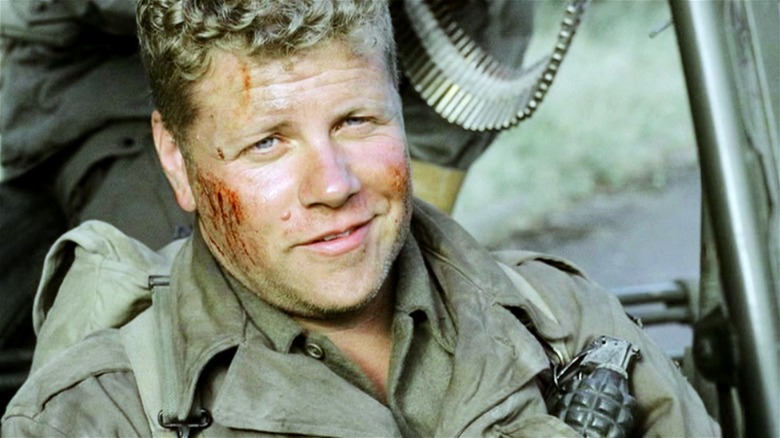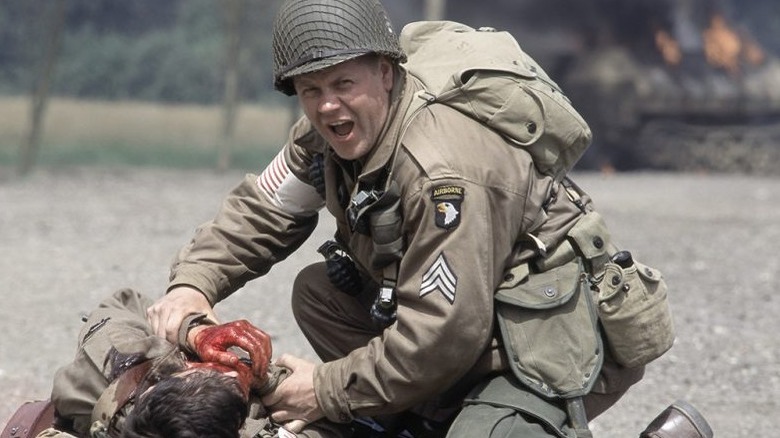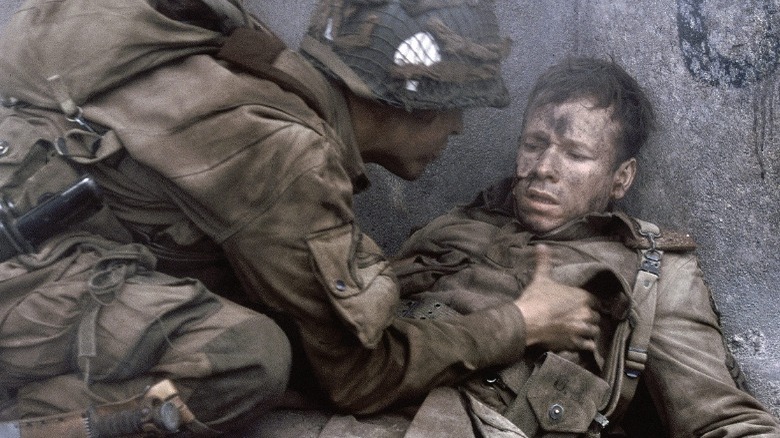Band Of Brothers' 'Visceral' Battles Didn't Feel Fake To Michael Cudlitz
It's been more than 20 years since HBO released its acclaimed war drama miniseries "Band of Brothers," which dramatized the history of Easy Company and the American soldiers who fought in and up until World War II. There is a good reason it still manages to impress to this day — apart from showcasing the visceral, uncompromising horrors of war, it authentically captured the cruelty and pathos inherent in the millions of civilian lives lost in the process.
Based on historian Stephen E. Ambrose's 1992 non-fiction book of the same name, "Band of Brothers" deftly balances the heroism of those who fought for the cause and the senseless violence that plagued these times, while also lending a platform to the survivors, whose relay their real-life experiences at the beginning of some episodes.
In "Band of Brothers," Michael Cudlitz — best known for playing Abraham Ford in "The Walking Dead" — plays staff sergeant Denver Randleman, who earns the nickname "The Bull." Considered one of the best soldiers by his commanding officer, Bull is quickly promoted to Corporal after having fought in major battles, including the September 1944 Operation Market Garden (where he was separated from his unit and barely survived the ordeal) and the Battle of the Bulge in December 1944. As Bull's arc progresses, he participates in the occupation of Germany and Austria during World War II, and he receives several military medals for his valiant service.
Cudlitz spoke to Smithsonian Magazine on the 20th anniversary of the HBO miniseries, recounting a particular moment during filming that drastically altered his understanding of the true events that were being dramatized in that particular scene.
A 'holy s***' moment
Part of the reason why "Band of Brothers" makes for such powerful television is the way it conveys the scale and emotional weight in its depiction of the lives of those who fought on the front lines. Michael Cudlitz's character, Bull, is one of them, and the actor explained how real the battle scenes felt when the cameras were rolling and he was reloading his rifle and shooting blanks at fellow actors who were playing German soldiers:
"I call it my holy s*** moment. There is the smell of cordite and sulfur in the air. For a second, you feel like you caused that. There is something very visceral about it. We got the tiniest taste of what these guys might have gone through."
While Cudlitz helped bring a dramatized version of the real atrocities of war to life, the weight of filming these scenes added a layered tint to how he perceived history. After all, this is not a work based on fiction, making Cudlitz better appreciate what millions of American soldiers might have felt in those emotionally-charged moments, at least as much as possible from an empathic point of view.
As Bull's story can be traced back to his paratrooper days, and his journey captured the multidimensional vignettes of living such an existence, this made for insightful and greatly immersive storytelling. What also helped is that none of the soldiers were depicted through the lens of objective morality, which lent to a rich narrative about flawed characters who are molded by the combination of extreme circumstances and painful personal choices.
Understanding history
All of the cast members, including Michael Cudlitz, spent significant time getting to know the real-life soldiers that they play, which informed their understanding of the complex characters they were supposed to embody. In the same interview, Cudlitz recounted the first time he called the real Denver Randleman, and how apprehensive he felt about getting "everything right" in an effort to relay authentic sincerity:
"I must have stared at my phone for 45 minutes before I called [Randleman] for the first time. I kept going over in my head how I was going to start this conversation. And the more I did that, the stupider it sounded. I wanted to get it right. I mean, that was the point behind the whole project: We wanted to get everything right."
The need to stay true to history while authentically portraying the experiences of the soldiers who lived through it formed the crux of "Band of Brothers," with the actors garnering a more nuanced understanding of the gritty realities of war.
Any artistic medium that retells the horrors of war runs the risk of either sensationalizing the subject matter or drastically glamorizing it — "Band of Brothers" avoided these pitfalls by offering a grounded glimpse into one of the deadliest conflicts in human history. After all, some of the greatest stories are told from a place of informed empathy.


